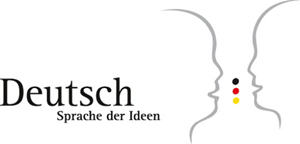Teil 1
Individual pages correspond to the pages in the textbook.
- Seiten 7-11
Aufgaben zu Seiten 7-11 - Seiten 12-20
Aufgaben zu Seiten 12-20 - Seiten 21-23
- Seiten 24-35
- Seiten 36-40

Develops the four language skills: speaking, reading, writing, and listening. Basic grammar is reviewed and new grammatical concepts are presented. Contemporary culture in German-speaking countries is given additional emphasis. Students studying German should begin to synthesize their acquired linguistic and cultural knowledge toward an understanding of their native language and culture. This course is also designed to help prepare those students who would like to visit or study abroad in a German-speaking country. GERMAN 206 is a required course for the major Languages and Cultures: German, but is open to all students. It satisfies General Education Requirements: 2 GEPs for Goal 1 - Communication and 1 GEP for Goal 7 - Arts and Humanities. This course is offered once per year.
Prerequisites: GERMAN 102 (German 2) or the equivalent.
GOALS AND OBJECTIVES: By the end of GERMAN 206, students attain a functioning ability to communicate in German in speaking, writing, listening and reading. Students learn language skills on the basis of selected cultural topics. Objectives are based on the Novice-High to the Intermediate-Low level of proficiency as described in the standards of the American Council for the Teaching of Foreign Language (ACTFL).
Specific Goals of German 206:
Speaking and Writing Ability
◊ handle selected tasks and social situations requiring an exchange of basic information related to
a. work,
b. school,
c. recreation,
d. self, family, home,
e. daily activities,
f. interests and personal preferences,
g. physical and social needs, such as food, shopping, travel and lodging;
◊ narrate and describe in familiar areas (personal information, common events) in all time frames;
◊ use cohesive devices (conjunctions, etc.) in connected discourse of several sentences or phrases;
◊ respond to direct questions or requests for information and ask a variety of questions to obtain information to satisfy basic needs, such as directions, prices and services;
◊ demonstrate emerging speaking abilities to use elements and conversational input to manage discursive tasks such as expressing opinions, narrating in various time frames, and describing people and things in increased detail.
Reading and Listening Ability
◊ skim and scan for information from texts at the intermediate-low level;
◊ read texts on contemporary society;
◊ understand and participate in basic conversational exchanges related to the desired speaking ability.
◊ For this semester, reading and listening skills will be developed on the basis of the drama by the Swiss author Friedrich Dürrenmatt Die Physiker.
The following are some examples of disruptive acts during class:
Any and every act of misconduct will affect grades; in the worst cases, such as plagiarism or cheating, students will fail the course.
Students who commit an act of academic misconduct will be subject to sanctions as stipulated by the university. See BU Policy 4802 secton H.
NOTE: The Student Health Center (SHC) does not issue student illness excuses for missed classes.

◊ Attendance and regular active participation is essential. Every absence and lack of preparation will diminish the final grade.
◊ Students are responsible for any and all assignments sent to their BU email address or posted on BOLT.
◊ Written essays must be submitted as an MS-Word document in the disignated folder on BOLT. No assignments will be accepted as email attachments.
◊ Voice recordings will be submitted on BOLT. Students may be required to use the resources in the Language Laboratory in the Department of Languages and Cultures.
◊ Assignments are accepted on the due date only, unless there is compelling need to submit a late assignment.
◊ Students are responsible for all computer assignments and must use a computer that can access and operate all the required files and functions. The language laboratory is available for all computer activities.
◊ Two hours of preparation is expected for each hour in class--ten hours of preparation per week.
◊ Students are expected to study the material. Completing assignments and attending class are only part of the learning process.
◊ Attitude will contribute significantly to the final grade, even though it is not evaluated in quantative terms.
◊ The final project for GERMAN 206: Tuesday, 10 May 2022, 10:00AM.
◊ Grades posted on BOLT do not represent the official grade record; grades posted on BOLT allow students to gauge their progress during the semester.
◊ No extra credit assignments will be given.
◊ These procedures are subject to change at any time.
Grade distribution (tentative):
◊ Quizzes and assignments: 25%
◊ Active participation in class and in other activities: 25%
◊ Three mini-projects: 25%
◊ Final project: 25%
Herrndorf, Wolfgang. Tschick. Reinbeck bei Hambburg: Rowolt, 2012. (Provided by instructor.)
Herrndorf, Wolfgang. Why We Took the Car. trans. Tim Mohr. London: Andersen Press, 2014. (Provided by instructor.)
◊ Standard 8½" by 11" lined writing paper, either loose-leaf in a binder or a bound notebook.
◊ Supplemental materials will be available as handouts or pdf files on BOLT.
◊ Other resources include Internet sites and apps as needed.



The lesson plan only sets approximate goals and can be changed at any time.
Please follow this link for the tentative plan for GERMAN 206

Individual pages correspond to the pages in the textbook.